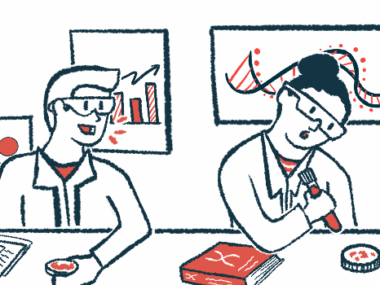7 tips to create good sleep hygiene with Huntington’s disease
Consistent habits, limiting screen time, and other recommendations for rest
Written by |

Living with Huntington’s disease (HD) presents rare challenges, including managing symptoms that can affect physical, mental, and emotional well-being. One of the often overlooked aspects of maintaining health with HD is cultivating good sleep hygiene. When sleep is interrupted or inadequate, the ripple effects on our bodies and minds are undeniable.
I’ve experienced firsthand how disrupted sleep can derail an entire day. On those nights when I can’t seem to fall asleep or stay asleep, I wake up feeling groggy, irritable, and less coordinated. My mood takes a hit, small frustrations seem monumental, and I struggle to focus on tasks.
So what exactly is sleep hygiene, and how can you use it to support better health with HD? Here are seven practical tips to improve your sleep hygiene and reap the benefits of restorative rest.
1. Establish a consistent sleep schedule. Going to bed and waking up at the same time every day helps regulate your internal clock, making it easier to fall asleep and wake up feeling refreshed. Irregular sleep schedules can confuse your brain, leading to difficulty winding down at night. For those with HD, a predictable routine can also help reduce anxiety around bedtime and create a sense of stability.
Tip: Use an alarm to remind you when it’s time to start winding down, not just when to wake up.
2. Create a sleep-friendly environment. Your bedroom should be a sanctuary for rest. Keep it cool, dark, and quiet, as these conditions are optimal for sleep. Consider blackout curtains, a white noise machine, or even earplugs to block out distractions. For people with HD who may experience restlessness, having a calm environment can signal to your body that it’s time to relax.
Tip: If chorea movements make falling asleep uncomfortable, experiment with weighted blankets or ergonomic pillows for added comfort and stability.
3. Avoid stimulants before bed. Caffeine, nicotine, and even alcohol can interfere with your ability to fall and stay asleep. These stimulants can make you more alert or interrupt your sleep cycles, which are especially important for people with HD who may already struggle with fatigue. Aim to avoid stimulants at least four to six hours before bedtime.
Tip: Instead of reaching for a caffeinated beverage in the late afternoon, try a caffeine-free herbal tea to wind down.
4. Limit screen time in the evening. The blue light emitted by phones, tablets, and computers can interfere with melatonin production, the hormone that helps regulate sleep. With HD, it’s particularly important to avoid overstimulating your brain before bed. Aim to turn off screens at least an hour before bedtime and replace screen time with relaxing activities like reading or gentle stretching.
Tip: If you use your phone for a bedtime meditation app, enable the blue-light filter or “night mode” feature.
5. Practice relaxation techniques. For those of us with HD, managing stress and anxiety can be a daily battle, and these feelings can peak at night. Engaging in relaxation techniques can help calm your mind and body, making it easier to transition into sleep. Breathing exercises, progressive muscle relaxation, or guided meditations can be powerful tools to help you wind down.
Tip: Try the 4-7-8 breathing method: Inhale for four seconds, hold your breath for seven seconds, and exhale slowly for eight seconds.
6. Be mindful of your evening diet. Eating heavy meals or drinking too much liquid before bed can disrupt your sleep. Spicy or acidic foods can cause discomfort, and too much liquid may lead to frequent trips to the bathroom, disrupting your rest. For people with HD, who may already face challenges with digestive health, paying attention to what and when you eat can make a big difference.
Tip: Opt for a light snack rich in sleep-promoting nutrients, like a banana or a handful of almonds, if you feel hungry before bed.
7. Get moving during the day. Regular physical activity can improve sleep quality by reducing stress and helping regulate your internal clock.
However, timing matters — exercising too close to bedtime can leave you feeling energized and make it harder to fall asleep. For people with HD, gentle forms of exercise, such as walking, yoga, or qigong, can support both physical and mental well-being.
Tip: Aim for at least 20-30 minutes of movement during the day, preferably in the morning or early afternoon.
When I stick to these sleep hygiene habits, I notice a remarkable difference. My energy levels are higher, my mood is more stable, and I feel more productive and present throughout the day. Restorative sleep supports memory, learning, and emotional regulation — all areas that can be affected by HD.
Building better sleep habits takes time and effort, but the rewards are worth it. Whether you’re living with HD or supporting someone who is, prioritizing sleep hygiene is a simple yet powerful way to improve overall health and quality of life. So tonight, consider adopting one or two of these tips, and take the first step toward better sleep — and better days ahead.
Note: Huntington’s Disease News is strictly a news and information website about the disease. It does not provide medical advice, diagnosis, or treatment. This content is not intended to be a substitute for professional medical advice, diagnosis, or treatment. Always seek the advice of your physician or other qualified health provider with any questions you may have regarding a medical condition. Never disregard professional medical advice or delay in seeking it because of something you have read on this website. The opinions expressed in this column are not those of Huntington’s Disease News or its parent company, Bionews, and are intended to spark discussion about issues pertaining to Huntington’s disease.







Roy Nierenberg
great advice on an important problem for people with HD.
I have other hacks that I use.
Sleep as long as you can
Take 1 mg of melatonin 90 minutes before expected time you want to go to sleep.
Also good advice., be gentle with yourself.
Roy Nierenberg